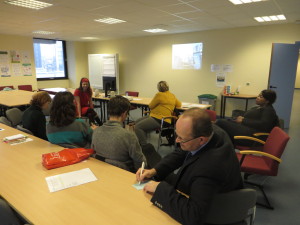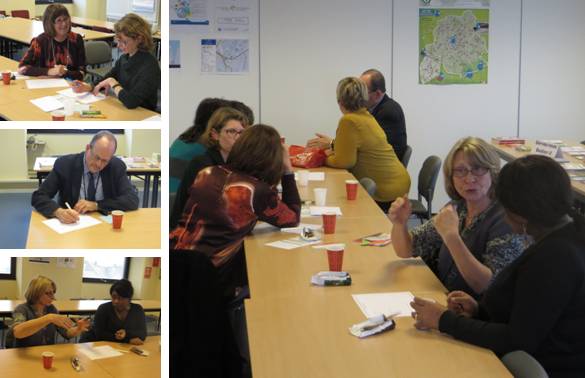I recently led a workshop on “Sustainable city” at SPF Justice (the Federal Ministry of Justice in Belgium) as part of its “Day of Sustainable Development”. This workshop was a mixture of a lecture on the concepts and concrete examples relate to “sustainable city”; interaction and discussion; as well as a role game on “what sustainable city are you”.
The participants came up with their own understanding of this concept, and “sustainable city” to them in particular meant:

- The priority on environment and quality of life:
- the importance to create green spaces for recreation, for spending time outdoor and creating links; reducing pollution; reducing waste and sorting it out ;
- but also, ensuring social mixture; fairness and solidarity developing respect (of others, of territory).
- Providing a more accessible mobility infrastructure;
- Developing new energy efficient buildings;
- Supporting change of enterprises but also bringing in new ideas and innovations;
- Managing budget in light of new “green” – and presumably costly – technologies and improvement;
- Moving to the strategic and political levels;
- Acting at a local, everyday, level, while ensuring a better future for ourselves and following generations.
The discussion was lively and everybody came up from their own personal and professional experiences. Examples of local initiatives as well inspirations from other cities were shared.
A few things emerged from the discussion on the processes still required to move towards more sustainable forms of cities, both as a citizen and as a professionals working in a given organisation:
- Making information accessible: as citizens, they felt that it is difficult to know where to get information from, or how to get in contact with people from the administration (“is sending an email just ok?”). Fair enough, the presentation gave many examples of what is happening in Brussels and beyond, but how can citizens get to know about it? And also, what does it mean that there are some programmes/strategies when citizens do not see the results (e.g. the Waste and Pollution Plans although the participants felt the city was extremely dirty)?
- One big frustration was about the lack of communication and transparency: being clear about objectives and processes would be more than welcome. The best example of unclear – and frustrating process – which was given was that of making the Brussels’ centre pedestrian organized through an unclear consultation and without a systemic view of consequences (e.g. to develop a well functioning public transport infrastructure while preventing cars to enter the city center). Ghent was cited as a good practice in this regard with its new mobility plan.
- One lady wishes to take her daughter to school by tram. But she cannot because of their limited frequency. She therefore needs to combine car and then public transport in order to get to work on time and within good transport condition. The conclusions were that such mobility policies should be looked at transversally, as well as holistically, including people at the heart of the processes.
- Changing a city requires taking risks. Beyond one’s fears, at individual, strategic and political levels. Even when there is a lot of hopes and desires for change, this step needs to be overcome. And this appears to be still a major barrier.
- How to make changes happening in an administration (or in any other setting) when the rules are very rigid? Such a limit can prevent some motivated people to initiate new movements. As we showed in our work from Social innovation in cities, it seems to be about finding the grey zone where you can operate without asking for permission. For example, installing a repair café/book box just outside the building but close enough to it so that those motivated can take part in it. And then, spread around the world for later acceptation by the hierarchy…
- Who should and how to educate people. Not only children but also adults, to make them respectful citizens…

This workshop was extremely rich in getting expertise from the ground as well as stressing once more, the importance of processes in order to move towards more sustainability. Social innovations in terms of bringing new ideas and initiatives, but also as an internal process, would be key in this. The next step might be to identify the normativity considerations in relation to this objective… And to support the co-creation processes towards this direction.
